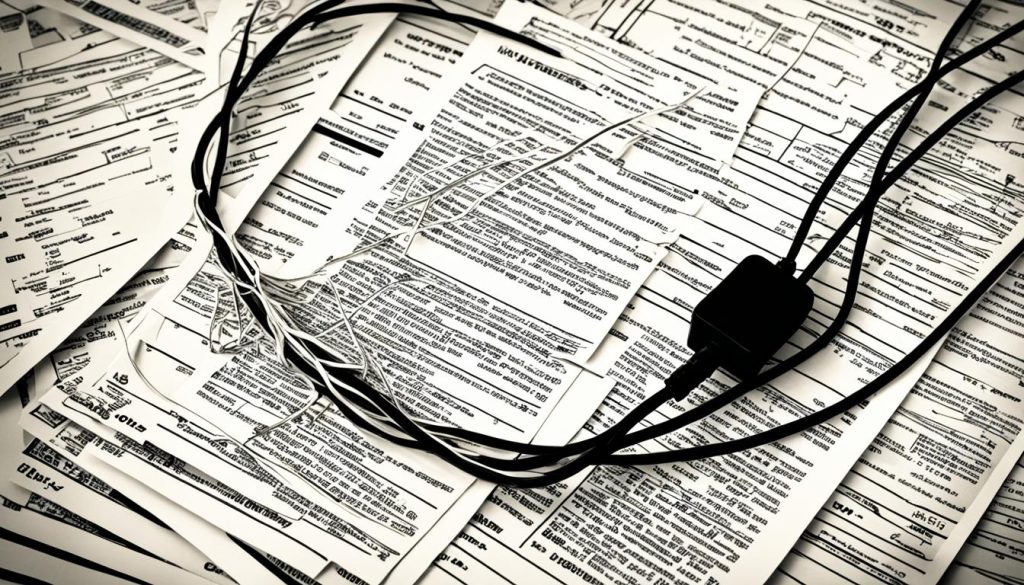In today’s digital age, Internet Protocol Television (IPTV) has revolutionised the way we consume entertainment. Offering a vast array of TV channels, movies, and live sports events, IPTV delivers content directly over the internet, providing unparalleled convenience and accessibility. However, with the allure of accessing premium content without paying the appropriate fees, some individuals may be tempted to explore illegal IPTV services. The use of these unauthorised IPTV services exposes users to significant legal risks and consequences, which this article will explore in detail.
Key Takeaways
- Using unauthorized IPTV services can lead to copyright infringement and criminal penalties.
- Security and privacy concerns are associated with illegal IPTV platforms, exposing users to data breaches and cybercrime.
- Engaging with illicit IPTV services contributes to criminal activities and undermines the legitimate media industry.
- It is crucial to use only legitimate IPTV providers that comply with licensing and regulatory requirements.
- The legal landscape surrounding IPTV continues to evolve, and staying informed is essential to navigate the digital entertainment landscape responsibly.
Understanding the Legal Landscape of IPTV
IPTV, or Internet Protocol Television, is a revolutionary technology that delivers television services directly through the internet, rather than traditional terrestrial, satellite, or cable television formats. This innovative platform offers users the convenience of accessing a vast array of television channels, movies, and other video content via an internet connection.
Definition of IPTV
IPTV stands for Internet Protocol Television. It is a technology that enables the delivery of television services over the internet, providing users with the ability to access a wide range of television channels, movies, and other video content through an internet connection.
How IPTV Works
IPTV operates by using a broadband internet connection to deliver television programming to users. The content is then delivered to the user’s television set through a set-top box or a similar device. The set-top box decodes the video stream and converts it into a format that can be displayed on a television screen. IPTV services can be delivered in two ways: live television broadcasts or video-on-demand services.
UK Copyright Law and Licensing Requirements
One of the primary factors that determine the legality of IPTV services in the UK is the UK Copyright Law. This law states that it is illegal to distribute copyrighted material without the permission of the copyright owner. IPTV providers that offer channels that are copyrighted without the permission of the copyright owner are breaking the law. However, it is important to note that not all IPTV channels are illegal. Some IPTV providers offer channels that are licensed and have the permission of the copyright owner. These providers are operating legally and are not breaking the UK Copyright Law. IPTV providers that offer channels that require a license to be viewed legally must have the appropriate license to legally offer those channels.

What are the legal risks of using unauthorised IPTV services?
Copyright Infringement and Penalties
The use of illegal IPTV services is a direct violation of copyright laws that protect the intellectual property of content creators and providers. When viewers access copyrighted material without proper licensing or permissions, they commit copyright infringement. Such actions can lead to legal consequences not only for the service providers but also for the consumers themselves, facing potential lawsuits and penalties. In the UK, copyright infringement is a criminal offense and can result in fines, legal action, and even imprisonment.
Security and Privacy Concerns
Unauthorised IPTV services often operate without proper security measures, exposing users to serious data breaches and cyberattacks. Personal information, including credit card details, can be harvested by these rogue platforms, making users vulnerable to identity theft and fraud. The data collected may be sold on the dark web, putting individuals’ privacy at risk. Engaging with illicit streaming platforms also exposes users to the risk of downloading malware, viruses, and other harmful software.
Contributing to Criminal Activities
By using illegal IPTV services, consumers inadvertently contribute to criminal organisations engaged in copyright infringement and piracy. The revenue generated from these activities funds illegal operations and undermines the legitimate media and entertainment industry, hurting content creators and legitimate providers. The use of unauthorised IPTV services directly impacts content creators, artists, and production houses by depriving them of rightful earnings, which can significantly influence the quality and diversity of content accessible on legitimate streaming platforms.
Conclusion
In conclusion, the use of unauthorised IPTV services poses significant legal risks to consumers. Copyright infringement, security and privacy concerns, as well as contributing to criminal activities, are all serious consequences that users must be aware of. To ensure a safe and legal streaming experience, it is crucial to use only legitimate IPTV providers that comply with the necessary licensing and regulatory requirements.
By doing so, users can enjoy their favourite content without compromising their legal standing or exposing themselves to potential harm. The legal landscape surrounding IPTV services continues to evolve, and staying informed is essential to navigate the digital entertainment landscape responsibly.
Consumers must be vigilant in their choice of IPTV providers and prioritise the use of legitimate services to avoid the pitfalls of illegal streaming. Responsible and informed decision-making is key to safeguarding one’s rights and maintaining the integrity of the media and entertainment industry as a whole.
FAQ
What is IPTV?
IPTV stands for Internet Protocol Television. It is a technology that delivers television services over the internet instead of traditional terrestrial, satellite or cable television formats. IPTV services offer users the ability to access a wide range of television channels, movies, and other video content through an internet connection.
How does IPTV work?
IPTV operates by using a broadband internet connection to deliver television programming to users. The content is delivered to the user’s television set through a set-top box or other similar device. The set-top box decodes the video stream and converts it into a format that can be displayed on a television screen. IPTV services can be delivered in two ways: live television broadcasts or video-on-demand services.
What are the legal requirements for IPTV in the UK?
One of the main factors that determine the legality of IPTV in the UK is the UK Copyright Law. The law states that it is illegal to distribute copyrighted material without the permission of the copyright owner. IPTV providers that offer channels that are copyrighted without the permission of the copyright owner are breaking the law. It is important to note that not all IPTV channels are illegal. Some IPTV providers offer channels that are licensed and have the permission of the copyright owner. These providers are operating legally and are not breaking the UK Copyright Law. IPTV providers that offer channels that require a license to be viewed legally must have the appropriate license to legally offer those channels.
What are the legal risks of using unauthorised IPTV services?
The use of illegal IPTV services is a direct violation of copyright laws that protect the intellectual property of content creators and providers. When viewers access copyrighted material without proper licensing or permissions, they commit copyright infringement. Such actions can lead to legal consequences not only for the service providers but also for the consumers themselves, facing potential lawsuits and penalties. In the UK, copyright infringement is a criminal offense and can result in fines, legal action, and even imprisonment.
What are the security and privacy concerns with using unauthorised IPTV services?
Unauthorised IPTV services often operate without proper security measures, exposing users to serious data breaches and cyberattacks. Personal information, including credit card details, can be harvested by these rogue platforms, making users vulnerable to identity theft and fraud. The data collected may be sold on the dark web, putting individuals’ privacy at risk. Engaging with illicit streaming platforms also exposes users to the risk of downloading malware, viruses, and other harmful software.
How does the use of unauthorised IPTV services contribute to criminal activities?
By using illegal IPTV services, consumers inadvertently contribute to criminal organisations engaged in copyright infringement and piracy. The revenue generated from these activities funds illegal operations and undermines the legitimate media and entertainment industry, hurting content creators and legitimate providers. The use of unauthorised IPTV services directly impacts content creators, artists, and production houses by depriving them of rightful earnings, which can significantly influence the quality and diversity of content accessible on legitimate streaming platforms.



